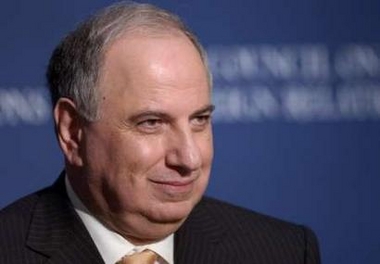|
Chalabi: US troops may leave Iraq in '06
(AP)
Updated: 2005-11-12 10:16
U.S. troops could begin leaving Iraq in significant numbers sometime next
year, so long as Iraqi forces are properly armed and trained by then, Iraqi
Deputy Prime Minister Ahmad Chalabi told a U.S. audience on Friday.
Chalabi, the controversial former exile who came to New York after meetings
with top U.S. officials in Washington, said the Iraqi army should be equipped
with American weaponry and properly trained to protect itself against the armies
of its neighbors, which include Syria and Iran.
They must also be given "more latitude" in recruitment, he told a gathering
at the Council on Foreign Relations.

Iraqi Deputy Prime
Minister Ahmad Chalabi speaks to the Council on Foreign Relations, in New
York November 11, 2005.[Reuters] | "If we do the right thing together, I think significant American troops can
be withdrawn from Iraq without causing a serious security threat during 2006,
next year," he said.
Chalabi's prediction contradicts the message from the Bush administration,
which has refused to set a timetable for withdrawal for the estimated 150,000
U.S. troops now in Iraq.
Earlier this year, U.S. military officials said they thought they could begin
fairly substantial troop withdrawals next spring. But they have since backed off
that claim, and in October, the commander of U.S. forces in Baghdad said it will
take up to two years for the Iraqi army to have the military leadership and
supplies it needs to operate on its own.
Chalabi, who plans to run in Iraq's Dec. 15 parliamentary election, received
a warm reception from the council and moderator Fouad Ajami, a professor at
Johns Hopkins University.
He got one question about claims that his exile group, the Iraqi National
Congress, may have fed information to the U.S. that Saddam Hussein had amassed
hidden arsenals of weapons of mass destruction. His critics say that helped fuel
President Bush's case for war.
"I want to tell you that the fact that I perpetuated a case for war based on
weapons of mass destruction is an urban myth which is not rooted in reality," he
said, echoing remarks he made in Washington earlier this week.
The only tense moment during the talk came when Arianna Huffington, a
columnist and blogger who has opposed the Iraq war and criticized Chalabi, tried
to follow up the question on intelligence but was cut off by the moderator,
Ajami, who refused to call on her. The actor John Cusack, a fellow Bush
administration opponent and blogger on her Web site, sat next to her quietly
looking on.
|